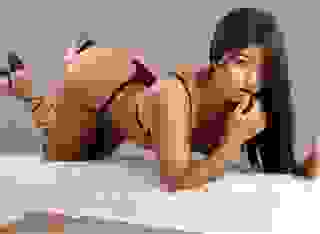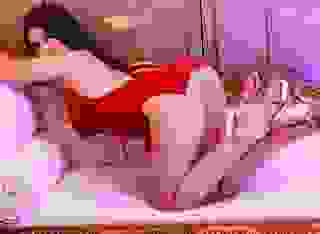- Sci-Fi & Fantasy
- Meta-Human
Note: You can change font size, font face, and turn on dark mode by clicking the "A" icon tab in the Story Info Box.
You can temporarily switch back to a Classic Literotica® experience during our ongoing public Beta testing. Please consider leaving feedback on issues you experience or suggest improvements.
Click hereStrange and wondrous beings of colorful energies danced in the Helix Nebula. They resembled jellyfish, luminous with dynamic plasma flows, their bodies composed of mysterious particles and forces which very much interested governments, corporations, militaries, and academics.
The nebula, also known as "the Eye of Sauron", or simply NGC-7293, was located in the Aquarius constellation, between human and blorban space, and it was there, six-hundred and fifty light-years from home, that Danard had lived for the past five months.
Doctor Danard Zangwah was a particle physicist, aged forty-three, though gene therapy kept his biological age closer to twenty-three. His older sister was the governor of the Jovian sector, which he was sure played into why he was selected for the honor of doing such groundbreaking work on a newly-built station. His skin was considerably darker and his hair curlier than his sister's, but they had the same last name, and it was hard to get away from the political theater that seemed to entangle everyone in his family.
He had never married, though he certainly had some fun in the academy of science with several partners over the years. Sometimes it was a more formal kind of relationship, other times it was just hooking up for fun. The occasional romp between the sheets had helped to take the edge off the intensity of his intellectual pursuits. But now he was committed to his work, and the only human faces he saw in-person belonged to the crews of the supply ships that came out to the research station once a month.
The United Nations had a contract with the Blorban Stellar Union to jointly staff the deep-space science station as a part of the research agreement between the two governments. There was a lot of outrage from the science and the finance departments of the UN when the blorbans only sent one scientist, obligating the humans to only send one as well, as per the dictates of the contract. Understandably, this ruffled some feathers because the UN built the station to accommodate a crew of fifty. Danard didn't mind having a spacious habitat almost to himself, which was luxurious compared to the spartan, space-efficient stations he was used to.
The station was shaped like a wheel within a wheel, and spun around a counter-rotating docking section at the axle. It was nearly a mile to walk all the way around the inside of the outer ring, which had a comfortable, earth-like gravity from the rotation. The inner ring was low-G, being closer to the axle, and there was a zero-G laboratory in the central section.
Danard sat in a padded, swiveling chair in the particle analysis lab located in the inner ring. He was typing up a report on his latest batch of experiments on the exotic nebula gases expelled by the "jellies". His degree wasn't in xenobiology, but studying these space-dwelling creatures required expertise in particle physics, given their non-carbon-based structure.
The door behind him quietly swished open. He focused on finishing the sentence he was typing, then stretched, cracked his neck one way, then the other.
"I'll never get used to that," Doctor Xib said as she effortlessly slid across the room to the electron microscope. She was followed by a small cleaning robot that scrubbed the floor.
Doctor Xib was his research partner, the one other sentient on the station. She was blorban, from the Curator Order of Makarafruma, a tropical world where her species evolved three million years ago. Her people were molluscoid organisms, and indeed, she looked very much like a pink snail. Her large, opalescent spiral shell was as tall as Danard was from head to toe, and from it her moist "foot" emanated, as well as her long, pink "neck" and pair of tentacle-like arms, which had three small feelers on each end, which she used like fingers.
"Why is that?" Danard asked in his silvery voice, swiveling in his chair.
"I don't have bones," she answered. "When a blorban hears cracking, we associate it with cracking shells, which is a bad thing. An evolutionary reflexive reaction."
In the first few weeks on the station, whenever Danard looked at her, he felt a reflexive revulsion from her appearance, but the reaction faded as the weeks turned into months, and he had learned to appreciate her looks as a scientist does a unique and interesting life-form. More than that, her shell was beautifully pattered with bold, almost neon-bright colors, and it had a mesmerizing effect on creatures with good eyesight. Certain patterns were considered more attractive by many blorbans, but Danard was thankful he didn't have blorban sentiments. It was confusing enough to hear Doctor Xib's deep, melodic, womanly voice coming from the wide lips of such an alien creature. Her accent was subtle and interesting.
Blorbans were musically gifted and could modulate their voices in part thanks to their elastic vocal organ. Though natural blorban speech sounded very alien to humans, Doctor Xib sounded as human as any woman born on Earth, and she had an adept sense of humor about it.
Beyond their work, they had talked about philosophy and ethics, and he found he very much enjoyed her company. He respected Doctor Xib as a scientist, but he also considered her a friend.
"Good morning, by the way," Danard said.
"We're not on a planet, Doctor Dan," she replied as she had many times before. "There is no 'morning' or 'evening' out here."
"I wish you a good morning nonetheless," he said with a smile as he swiveled back to review his report.
"I have a theory that there might actually be a morning here 'someday'," she curled her wide lips in a smile. "I think the jellies are building a protostar."
"Building a...." he trailed off quizzically as he swiveled slowly back to face her.
"You've been tracking the distribution of particles in the nebula," she stated. "I'm surprised you haven't come to the same conclusion."
Danard glanced to his report, which did indeed contain data about the movement of gasses and dust in the nebula, which showed the spin of the nebula was minutely, gradually increasing since they began taking measurements, but he couldn't make the leap to her theory.
"The nebula is spinning faster, isn't it?" She asked rhetorically.
"Um...yes, it is. But that could be from galactic electromagnetic currents."
"They don't match up. I've found a correlation with the movements of the herd."
Danard blinked. If there was a connection, then these life-forms could be the equivalent of interstellar beavers, building massive fusion furnaces.
"Why would they do that?" He asked.
"I'm sure I don't know," she answered. "But the implications are...immense. For all we know, these creatures could live inside stars. They could be inside every star in the galaxy. We haven't exactly been looking for them there."
Danard's eyes flicked back and forth as he considered the idea. It was possible. If it were true, and they could prove it, it could completely upend conventional theories about star formation.
"I'm going to check the scopes." He bounced to his feet and quickly walked from the room, up the curving hall to the observation room, where monitors displayed telemetry data from the tracking of the jellies' energy signatures.
He expected to find the jellies spread out in their "grazing" patterns, but right away he noticed the herd was tightly grouped, which was unusual. What was more, there was a solid object moving amongst them. An asteroid, he wondered? He pulled up a visual feed from one of the telescopes.
The jellies seemed to be playing with the object, passing it back and forth amongst themselves. A spectrographic analysis showed the object to be metallic.
He tapped the intercom.
"Xib?" He transmitted.
"Yes?" She responded.
"They have something. Metallic, three meters long, two in girth."
"Really? We must get a closer look!"
"I'll take the shuttle. Back me up from flight control?"
"On my way."
Danard suited up in his flexible vacuum suit and helmet, then piloted the sub-light science shuttle from the docking bay. After about an hour of acceleration and subsequent deceleration, he was within a few kilometers of the herd. He was careful to approach slowly.
"Bringing up visual," he announced to Doctor Xib on the radio. He activated the cameras and zoomed in on the object.
It looked like an escape pod.
"Is that...?" Xib wondered out loud.
"Could be. It's not any configuration I recognize."
"Danard, I think this could be an occasion to violate our passive study protocol."
"I agree. I'm bringing it in."
He shivered at the thought of someone actually being inside it, and if they were dead or not. He gave instructions to one of the ship's probes to retrieve the pod. The ever shy jellies scattered when the probe came close, and it had no trouble pushing it toward the shuttle.
Danard had the probe gently nudge it into the cargo bay. He returned to the station at once, resisting the urge to leave the pilot's seat and look at the pod. Once it was safely in the zero-G laboratory, the two scientists examined it through the large, glass window beside the containment chamber.
There were no legible markings left on it, and it looked very old. The pod was pock-marked with holes and dents, from meteorites, or perhaps from battle. Troublingly, the largest cratered hole in the pod was right were an occupant's head might have been. Tentatively, they had a robotic arm open the lid.
There was a body inside, and it was instantly clear that the occupant had died from the impact that had smashed its cranium into space. Even so, the rest of it was well-preserved in its frozen, airless tomb. It appeared humanoid.
Danard was befuddled beyond belief, and yet, after hours of subsequent scanning, tissue sampling, and holographic reconstruction, the data was undeniable: its skeletal structure and tissue was almost identical to human physiology. The baffling thing about it was that the tissue was carbon-dated to be fourteen million years old.
"This is amazing!" Xib gushed. "A distant relative of your species, perhaps?"
"No...that can't be," Danard frowned. "Humans hadn't even evolved yet, and wouldn't for millions of years after this fellow died."
"I'm going to sequence its DNA," She announced excitedly, and slid over to collect the sample box.
"I'm going to have a drink," Danard commented haggardly.
After Danard grabbed a bottle of brandy and a snack, he continued to analyze the pod itself to try and decipher where it came from and what had happened to it. Perhaps it only appeared to be old from some unknown phenomenon, but the carbon scoring on the pod's scorch-marks registered just as old as the body. Meanwhile, Doctor Xib had taken the tissue sample to the medical lab, followed faithfully by the floor-cleaning robot that ate up the rainbow sheen of polysaccharides and proteins left by her special method of locomotion.
It was clear to Xib that there was extreme decay on the molecular level from millions of years floating in space, where the specimen was exposed to cosmic radiation. She was astounded to find that unlike every other known carbon-based life-form in the galaxy, this creature had triple-helix DNA. Thus, though it appeared to be human, it was definitely not. The DNA was enormously complex, and she needed more material to successfully sequence it with the limited equipment on hand. She found Danard had fallen asleep at his desk. Not surprising, given that he had been working for over twenty-four hours.
Xib hadn't slept either, but she had became obsessed with unlocking the secrets of the specimen. Every time she collected another portion of the body for genetic material, she was frustrated by damaged or missing segments of code that prevented her from forming a coherent sequence, let alone a map of the whole genome.
Almost the entire specimen had been destroyed by the time she finally opened up the bones to get at the marrow. There, beyond all probability, she found intact cells that had been in suspended animation in the near absolute-zero temperature of deep space. She had to act quickly. Once thawed, the cell structures become unstable. She needed to revive the cells in order to replicate them.
The station wasn't specifically outfitted for genetic studies, but there was one lab adjacent to the medical bay for maintaining scheduled gene therapy for the crew, to ensure they had the longest possible lifespan.
One machine was used to develop RNA biomarkers for the early detection of diseases. It was this machine that Doctor Xib reprogrammed to stabilize the enormously complex cells from the marrow, and from there she could clone them and have unlimited material to sequence the genetic code. As long as the power didn't go out, it was safe.
Suddenly, just as she had started a cell culture in the nutrient paste of the machine, all the lights went out.
"No!" She cried. Xib turned the emergency release valve for the lab door and was distressed to see the lights were out in the corridor, as well. There was still gravity from the immense inertia of the rotating station, and there would be for weeks, but there was no electricity being supplied to anything. The reactor must have shut-down automatically, she reasoned, either from a malfunction or...
From a glassteel window of the corridor, she saw a spectacular display of lights from jellies only a few hundred kilometers from the station. They were dancing in pairs, pulsing, throbbing with light. This had never before been observed. It looked like some kind of mating behavior, she thought. Then she remembered that the jellies were capable of emitting a wide range of electromagnetic energy, a powerful burst of which could have triggered the automatic shut-down procedure. Even if she could restart the reactor core, another burst of energy could shut it down again, or worse. She needed to think of some way to temporarily power the gene-therapy machine before the cells were lost.
The cleaning robot behind her tail beeped questioningly. She craned her neck to look at her companion, which she had come to regard affectionately as a pet.
"I think you can help," she said, "but I'll need to borrow your battery."
*********
Danard felt himself getting shaken awake by Doctor Xib, and her clear, deep voice was urgent.
"Dan, wake up!" She urged. "I need your help!" She shined a lightstick close to his eyes.
"Wha--What is it?" He squinted.
"The reactor shut down. I think the jellies are mating!"
"The reactor shut down?!" He lurched to his feet. "Mating??"
"Electromagnetic pulses from their mating displays could compromise the circuitry of the station if we power it up again."
"I see. So...how long will we be without power?"
"I don't know."
"Well then...that's concerning. Can we broadcast a message?"
"Not without the reactor to power the quantum communicator. We may have to wait for the supply ship."
"Okay. Okay. We need to consolidate supplies. It's going to get cold. We need insulated water containers..." It was then that he noticed the specimen was gone. "Um, what happened to the popsicle?"
"The what?"
"The corpse."
"Oh. I used it all."
"What do you mean you 'used it'?"
"I had to sacrifice the material to break it down, to extract its genetic code."
"Ah. Did it work?"
"Well, yes...sort of."
"You can tell me about it as we gather supplies."
They placed drinking water containers in vacuum insulated cargo boxes so they wouldn't freeze, and brought together all the blankets they could find. There were plenty of them in the unused crew quarters of the station. They consolidated it all in the mess hall, in the low-G ring of the station. They followed every protocol for survival in an unpowered space habitat. Doctor Xib explained how she had extracted intact cells from the bone marrow of the specimen and had begun a cell culture.
"...and that's when the power went out," Xib continued. "I didn't have much time, so I used the battery from the cleaning bot to power the gene therapy machine for a few minutes. I reprogramed it to create a serum of the cell culture and injected it into my body."
Danard paused from setting up their makeshift thermal survival tent and let the information sink in.
"You what??" He blinked. "Why?"
"It was the only way to keep the cells alive, to preserve the genetic data. I attached the revived cells to RNA delivery cells, which should keep my immune system from dissolving the foreign material. It will be stored in my lymph nodes as my body tries to determine what it's dealing with. We can extract them later."
"Are you sure about this?" Danard asked. He wanted to trust Xib's biology expertise, but it seemed to him this was a hastily-conceived solution.
"Relax," she answered. "I know my body."
"But you don't know what you put into it," he remarked.
"I might have a reaction of some kind," she admitted. "But it's worth the risk. It's my body, it was my choice."
"Fair enough. But we are in a survival situation, so if you start feeling sick, let me know right away, okay?"
"I will."
The ambient temperature on the station was still pleasant enough, and would remain so for many hours, perhaps a couple of days. With all the energy that was normally generated by the reactor and all the systems it powered, the main temperature-related concern was usually keeping the well-insulated station from overheating. The station had an automated heat pump that used water and ammonia. Liquid ammonia freezes at minus 77 degrees Celsius, which was why it was used in the external radiators that dumped excess heat into space. Without any heat to dump, however, even the liquid ammonia would freeze. The outside surface of the station averaged minus 170 Celsius.
If they had to, they could restart the reactor and risk damage to their systems from an electromagnetic pulse from the jellies, but they hoped that the mating event would end soon. They watched the bright display from a window.
"Doctor Xib," Danard addressed formally, "may I ask you a personal question?"
"Of course, Dan," Xib replied.
"Have you ever had sex?"
"No, I never have," she responded casually, still gazing out the window.
"I must admit, I don't know anything about blorban mating habits."
"Blorban sex almost always results in offspring. Each coupling can produce hundreds of children. Overpopulation was an issue my people had to deal with early in our history as exhausted our resources. The most ethical solution was to have a lottery to determine who could reproduce, so that social stratification wouldn't occur. Some choose not to have offspring, even if they are selected. I was never chosen, but even if I had been, I was resolved to dedicate my life to science. How about you?"
"I rather hoped I could do both. Have children, I mean, and contribute to scientific knowledge. I just never met the right person."
"So, you have not had sex, either?"
"Oh, I have. Plenty of it, or at least, plenty enough to make me content to spend a few years out in deep space with an alien. Oh, um, no offense, doctor."
"None taken. As a xenobiologist, I have studied the mating behavior of many sentients, and that of humans is very interesting. You have one of the most diverse sexual behaviors of any one species, and are one of the most sexually active."
"Is that envy I detect?" He quipped with a smile.
"Hah! Ha--Hardly," she fidgeted. She felt flush.
"Don't blorbans engage in sex for pleasure, without producing offspring?"
"Well...yes. But mostly amongst the females."
"Why? Is there a culture of homophobia amongst the males of your people?"
"You could say that. Male sex involves piercing flesh with their penis-spear. I understand it's quite painful."
"Oh my."
"There are pain-inhibitors, of course, but the injuries disrupt one's daily routines."








